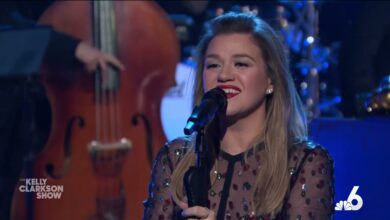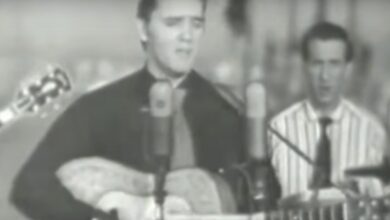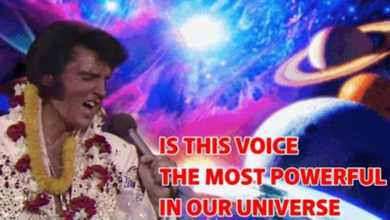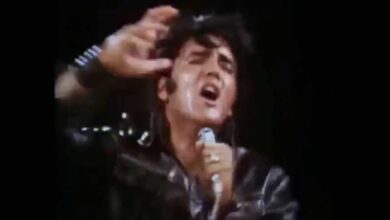Whenever I Hear This, It Continually Takes My Breath Away And Leaves Me Missing Him
The rehearsal of the Elvis Gospel Medley for the 1968 Comeback Special is not only a significant moment in Elvis Presley’s career but also a pivotal point in the history of live music performances. Throughout his life, Elvis maintained a profound connection to gospel music, which served as a foundational influence and nurtured his artistic soul. The Comeback Special marked a return to live performance for Elvis after a period dominated by films, and this medley showcased not just his vocal ability but his deep spiritual roots as well.
Beginning with “Sometimes I Feel Like a Motherless Child,” the rehearsal captures a vulnerable yet powerful moment. During this song, the interplay between Elvis and his backing singers creates a rich, textured sound that reflects the emotional weight of the lyrics. The arrangers and musicians contribute to this raw atmosphere, blending their harmonies seamlessly with Elvis’ lead. His dynamic vocal range is prominently displayed, transcending mere performance to reach the audience on an emotional level. This song, which speaks to feelings of isolation and longing, comes alive in his interpretation, rendering it both personal and universal.
As the medley transitions into “Where Could I Go But to the Lord,” listeners witness a remarkable shift in mood. Elvis manifests a sense of urgency and desperation in his delivery, capturing the essence of the search for solace and meaning that pervades the lyrics. During this piece, gospel influences are dialed up, unleashing a soulful rendition that evokes imagery of church gatherings and heartfelt prayer. The structure of the song allows him to explore his vocal agility, and his heartfelt passion resonates palpably throughout the rehearsal, further solidifying his status not only as a pop icon but as a genuine artist who profoundly understands the genre’s roots.
The climax of the rehearsal comes with “Up Above My Head,” a spirited tribute to joy and freedom often found in gospel music. Here, Elvis sheds any remaining solemnity from the previous songs, allowing his playful side to shine through. The infectious energy of the song serves as a celebration of life, and his rendition is infectious, making it easy for those present to feel uplifted. The backing singers complement this vibrant energy, creating tight-knit harmonies that enhance the exuberance of the piece. Elvis engages with his audience, and the rehearsal atmosphere feels alive with possibility and enthusiasm.
In essence, the rehearsal stands as an artistic statement about Elvis’ identity and his musical legacy. The authentic representation of gospel music during this period speaks volumes about his understanding of its importance. This mix of raw vocal performances and spiritual oratory resonates deeply with many listeners, ensuring that the medley remains an enduring part of Elvis’ legacy. It encapsulates his essence—not just as a performer but as a vessel for the gospel’s rich emotional landscape.
For Elvis, gospel music was not just a genre; it was a vital form of expression that reflected his struggles, successes, and deep-seated beliefs. Having been influenced greatly during his youth by the gospel music he heard in church, this medley becomes a heartfelt homage to those formative experiences. The sincerity in his voice conveys an innate truth that connects with audiences across generations.
Elvis’s choice to include gospel music in this special event serves as a powerful reminder of the genre’s influence on his career and its place in American culture. The medley emphasizes the universality of gospel music’s themes—faith, hope, and love—and invites listeners to reflect on their own spiritual journeys. The rehearsal also sheds light on a soft, introspective side of Elvis, contrasting the often larger-than-life persona cultivated by his film and rock n’ roll ventures.
As the Comeback Special aired, the gospel medley resonated deeply with audiences, highlighting the authenticity of his music during a time of growing disconnection in the world. It engaged the viewers emotionally at a time when cultural upheaval surged, drawing them into the sanctity of the moment. His ability to tap into the heartfelt essence of gospel music showcased why he is often dubbed the “King of Rock and Roll” while also highlighting his soulful connections to rhythm and blues.
In summary, the rehearsal of the Gospel Medley presents an intimate portrait of Elvis Presley as an artist and a performer bound by devotion to gospel music. The medley’s emotional depth, power, and joy encapsulate the spirit of Elvis and echo the timeless messages of hope found in the songs. Through his remarkable talent and heartfelt interpretation, this performance highlights why Elvis Presley remains one of the most revered musicians of his time. His gospel roots are intricately woven into his musical fabric, contributing to the lasting impact he has made on music and culture.



